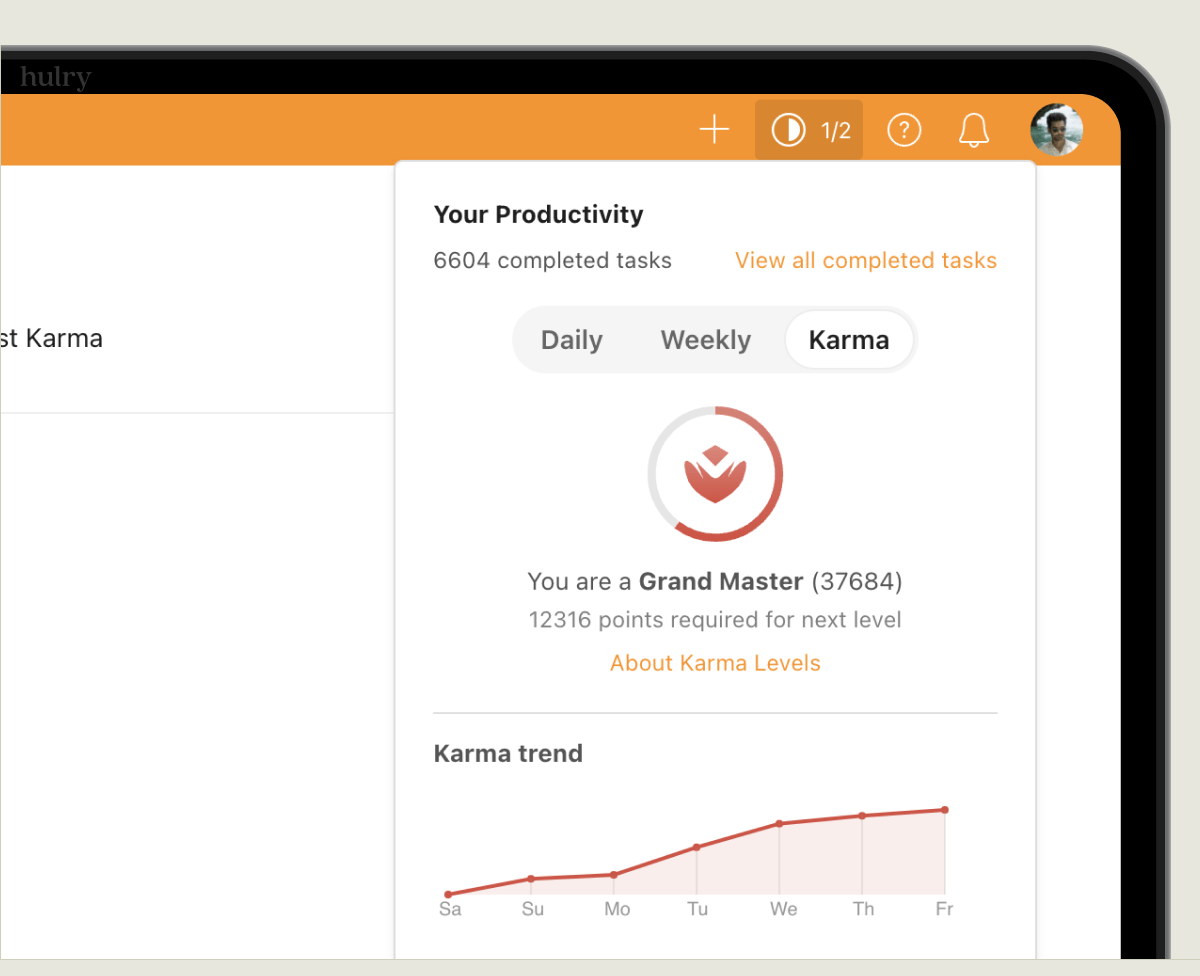You've earned a new badge.
Digital rewards and streaks have been the attention currency of new-age apps for years.
From language-learning apps like Duolingo to your plain-old to-do list app Todoist, every app tries to throw some gamification into the mix to keep us engaged.
And while it does boost motivation in the short term, doing something only to earn a badge pushes us into developing a bad habit.
Here's a real-life example:
I've been a Todoist user since 2018.
And one of the glorified features of the app is something called Todoist Karma.
It's a scoring system that earns you karma points every time you check off a task from your list, meet your daily goal and more.
As you accumulate karma points, you can move up the ladder and unlock new levels such as Expert, Master and Grand Master:

Now, here's the thing:
These levels don't open up any hidden features in the app or reward you in any other way.
What they're designed to do is to give you a massive ego boost with crafted appreciation like:
You're in the top 1% of users to reach this level!
I fell prey to this trap during the first year of using Todoist.
I was collecting karma points like a madman, hoping to hit a new daily high and make it to the next level.
The more tasks I checked off my list, the more levels I crossed.
And the more productive or accomplished I felt.
After all, I was rewarded with good karma points.
But here's the problem:
While this might seem like a healthy habit on the surface, deep down, we're just playing a vanity game.
The focus shifts from getting the most important things done to doing as many as possible every day.
And then, to win this fruitless game, our brain kicks in with all sorts of loopholes to beat the system.
I remember asking myself how many points I needed to collect to get to the highest level, which is called Enlightened.
This is absurd because the agenda of using a to-do list app should be to have a handle on things to do in a day and get them done.
Not racking up points.
Trapped in this vicious cycle of completing more and more daily tasks and scoring karma points, I set a daily goal of hitting 8–10 tasks and 50 tasks weekly.
But here's the problem:
We can realistically only complete about 2–3 high-impact tasks every day.
Now:
When I talk about high-impact tasks, I mean things that can move us towards our desired goals.
For example, for a content creator, those tasks might be:
- Writing a blog post
- Filming a video
- Reaching out to sponsors
- Drawing an art piece
But to hit the daily goal of 8–10 tasks, I had to either:
- Cram an unreasonable amount of tasks into my list
- Or, pad my list with low-value fluff like Water plants and Wash dishes
Both approaches created unnecessary pressure and set me up for failure right from the start of the day.
Because:
The longer my to-do list, the less productive and more stressed out I became.
When you wake up to a bazillion things to do in a day, it's easy to give up and resort to procrastination.
This leads to feeling guilty about not doing anything meaningful during the day and creates additional pressure for the next day.
The vicious cycle, remember?
So:
Over the years, I've learned to trim my daily to-do list into as compact of a list as I can.
These days, I aim to finish 1–2 high-value and 2–3 medium to low-value tasks every day.
It might seem like fewer things to do in a whole day, but focusing on the right tasks can help you make strides of progress with less.
And most importantly, I've stopped paying attention to my Todoist karma points and levels.
It's a nice dopamine hit to see karma points going up, but it's not something I need in my life.
Since then, checking off items from my daily to-do list has felt more like doing good work rather than playing a mindless game of chasing the next high score.
And there are days when I don't even use a to-do list.
Like Thursdays and Fridays when my primary focus is getting the newsletter ready and sent.
So:
While scores and digital rewards are advertised to help you stay motivated, use them cautiously or ignore them altogether.
They can drive you away from your core purpose of using an app.
Duolingo is another example.
What starts with a genuine interest in learning a new language can quickly drift off to mostly not breaking a long streak.
There's no need to punish yourself because you missed a day of Spanish lessons to enjoy some downtime or spend heartwarming moments with your loved ones.
Use technology as a helpful tool in your backpack. Not as another obligation you have to fulfil.
Ask yourself what's the purpose of a tool that you use daily.
For example:
I use Todoist to streamline my reminders and tasks and collect resources for review.
That's the whole intention of using it. Not collecting karma points.
When you realise this, you can use the tools to add value to your life, not subtract.



 In-depth articles, series and guides
In-depth articles, series and guides
